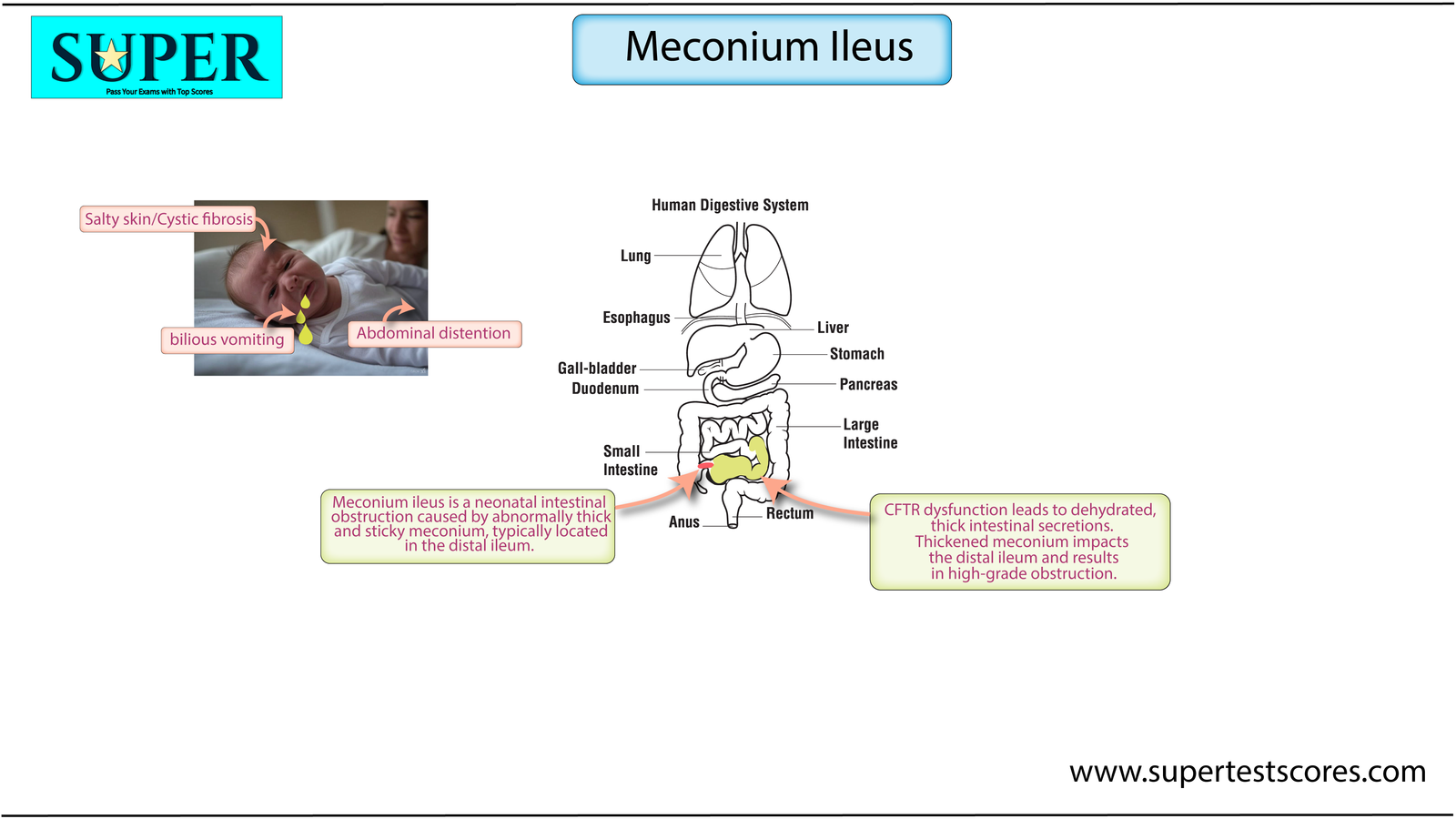Meconium Ileus
 Introduction
Introduction
Meconium ileus is a neonatal intestinal obstruction caused by abnormally thick and sticky meconium, typically located in the distal ileum. It is a hallmark of cystic fibrosis (CF) and often the first presentation of this genetic disorder.
Etiology
- Primary Cause:
- Cystic fibrosis due to mutations in the CFTR gene, leading to abnormal chloride and water transport in the intestines.
- Rare Cases:
- May occur without CF (e.g., isolated meconium ileus).
Epidemiology
- Occurs in 10–20% of newborns with cystic fibrosis. It is the only clinically relevant manifestation of cystic fibrosis at birth.
- More common in populations with high CF prevalence (e.g., Northern European descent).
- Affects males and females equally.
Pathophysiology
- Mechanism:
- CFTR dysfunction → Dehydrated, thick intestinal secretions.
- Thickened meconium impacts the distal ileum → High-grade obstruction.
- Complications:
- Proximal intestinal dilation.
- Volvulus, intestinal perforation, or meconium peritonitis.
- Types:
- Simple Meconium Ileus: No associated abnormalities.
- Complex Meconium Ileus: Associated with intestinal atresias, perforation, volvulus, or pseudocysts.
Clinical Manifestations
- Classic Signs:
- Failure to pass meconium within the first 24–48 hours of life.
- Abdominal distension and bilious vomiting.
- Palpable abdominal masses (impacted meconium).
- Severe Cases: Signs of bowel perforation or peritonitis.
Diagnosis
- Prenatal:
- Ultrasound: Echogenic bowel or bowel obstruction signs.
- Postnatal:
- Abdominal X-ray: Dilated loops of bowel, air-fluid levels, “ground-glass” appearance.
- Contrast enema (water-soluble): Microcolon with meconium flecks, “soap-bubble” sign.
- Sweat chloride test or genetic testing: Confirms CF.
Treatment
- Non-Surgical Management:
- Enema Therapy: Gastrografin or N-acetylcysteine enemas to break down meconium.
- Hydration and electrolyte correction.
- Surgical Management:
- Required for perforation, volvulus, or failure of enema therapy.
- Procedures include:
- Enterotomy with meconium evacuation.
- Resection of affected segments and temporary ostomy.
- Advanced options: Bishop-Koop anastomosis or end-to-end anastomosis.
- Cystic Fibrosis Management:
- Long-term care includes pancreatic enzyme supplementation, physiotherapy, and infection control.
Prognosis
- Good prognosis for isolated meconium ileus with timely treatment.
- Long-term outcomes depend on managing underlying cystic fibrosis, a chronic and life-limiting condition.
SUPERPoint
Meconium ileus is a neonatal bowel obstruction strongly associated with cystic fibrosis, presenting with failure to pass meconium and abdominal distension, managed initially with enemas and confirmed by genetic or sweat testing.
SUPERFormula
Patient presents with failure to pass meconium, bilious vomiting, and distension + Neonatal bowel obstruction +Caused by inspissated meconium + Strongly associated with CF + due to abnormal CFTR function + a microcolon on imaging + Treated with enemas or surgery in complicated cases = Meconium Ileus.
References:
Hackam DJ, Upperman J, Grikscheit T, Wang K, Ford HR. Pediatric Surgery. In: Brunicardi F, Andersen DK, Billiar TR, Dunn DL, Kao LS, Hunter JG, Matthews JB, Pollock RE. eds. Schwartz’s Principles of Surgery, 11e. McGraw-Hill Education; 2019.
